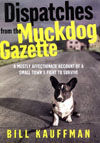
Comment
on this story
|
 |

While Knoxville and Batavia may seem leagues distant, in many ways, they echo each other
by Clark Stooksbury
The decline of cities, both large and small, has perplexed politicians, policy wonks, and civic boosters for decades now. Even rock stars such as Bruce Springsteen ("My Hometown") and Chrissie Hynde of the Pretenders ("My City Was Gone") lament their decline.
Bill Kauffman is neither a rock star nor a policy maker. He is a native of the upstate New York town of Batavia; population about 16,000. He returned to live there after working as an aide to Senator Daniel Patrick Moynihan and, then, as a libertarian journalist in Los Angeles and Washington, D.C. Dispatches From The Muckdog Gazette: A Mostly Affectionate Account Of A Small Town's Fight To Survive (Henry Holt, $22) is a memoir of his repatriation. Batavia is not a generic, idyllic small town—a Mayberry, North Carolina,
or Mandrake Falls, Vermont. Nor is it a sinister haven for bigotry and narrow-mindedness. It is a real place with virtues and failings all its own. 
Although he describes himself as "reactionary" and "provincial," Kauffman prefers another term for his world view. "I am—fanatically, unapologetically—a placeist. This makes me a virtual thought-criminal in an age of global homogeneity. 'Placeism' might be defined in the criminal code as the unreasoned love of a particular place, be it a neighborhood, village, city, or even state." As a placeist, he strives to find all that is beautiful and good in his little patch of ground looming between Buffalo and Rochester.
Among the good things he discovered was novelist and newspaper columnist Henry W. Clune. Kauffman befriended Clune when he was starting his second century of life. Clune hailed from just east of Batavia, in Rochester. He had a productive and successful career as a writer, although fate kept him from reaching the big time on several occasions. The two became friends after Kauffman profiled Clune for The Los Angles Times Book Review in 1990 and remained in regular contact for the final five years of Clune's life; after which, Kauffman was there to speak at his funeral. He quoted from Clune's memoir, finding a passage that stressed the late author's rootedness. "I have lived all my long life no more than 15 miles from the place of my birth...I always had a lurking wish to appear considerable in my native place, and in a career of nearly three-score years in the newspaper business in Rochester I achieved status and a desirable prestige. I always liked it here."
Batavia, like many towns, is locked in a constant struggle for its soul. Many of the important battles were lost decades ago when, under the guise of "urban renewal," tree-lined streets were destroyed and beautiful old homes were torn down.
The late Senator Daniel Patrick Moynihan diagnosed the problem while speaking about Auburn, New York. "In the 1950s, with a progressive government and newspaper, you got into urban renewal and destroyed everything of value in your town. If you had a reactionary newspaper, and a grumpy mayor, you might still have it." Moynihan's former flunky, Bill Kauffman, is determined to keep what remains.
One thing that remains is their minor league baseball team, the Batavia Muckdogs. The Muckdogs, known previously as the Clippers and the Trojans, almost succumbed to the God of Progress in the early 1990s when baseball mandarins foisted the Professional Baseball Agreement on minor league cities. "The PBA covered every last niggling detail of running a team—clubhouse showers, parking lots, lighting, the size of the locker room. Every last idiosyncrasy was smothered." But Batavia complied and held onto its team. The recent adoption of the new moniker has helped to revitalize the organization. Named for rich, onion-growing soil of North Genesee town of Elba, the Muckdogs inspired tremendous growth in team merchandising, but spurred a short-lived boycott among those concerned the rhyming potential of the word "muck."
In his fierce local patriotism and wealth of knowledge of the history of his home region, Bill Kauffman resembles an upstate New York Jack Neely. Much of Dispatches reads like a secret history of Batavia and its environs. He digs into the murky past of some of the area's politicians and business leaders and recalls events large (Batavia's role as the center of anti-Masonry in the 1830s) and small (a state senate write-in vote from 1861 for "Jeff Davis").
Although it does not offer a political program, Dispatches champions a distinctive world view that is decentralist with non-dogmatic libertarian leanings. This view often emerges obliquely in Kauffman's rambling (in the best sense of the term) style. His meanderings frequently have asides wrapped in digressions. Mostly it is a loving tribute to his home, even though he realizes that, "Batavia will always let you down, you can never depend on it, but it's home, and that has to be enough."

May 1, 2003 * Vol. 13, No. 18
© 2003 Metro Pulse
|